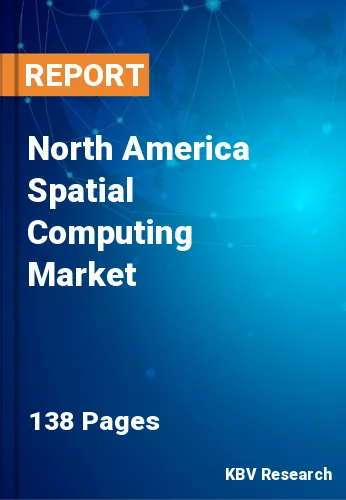The North America Spatial Computing Market would witness market growth of 18.8% CAGR during the forecast period (2023-2030).
Consumers and businesses increasingly seek immersive experiences for various purposes, including gaming, training, education, and entertainment. Spatial computing technologies, such as AR and VR, offer immersive and interactive experiences that cater to this demand. Enterprises are adopting spatial computing for various applications, such as remote collaboration, training, data visualization, and customer engagement. These solutions can improve productivity, reduce travel costs, and enhance communication in business environments. The healthcare sector is a significant growth driver. Spatial computing is used for medical training, surgical planning, telemedicine, and patient care. It allows healthcare professionals to visualize complex data and perform procedures more accurately. Spatial computing technologies are transforming education and training by providing immersive learning experiences.
This includes virtual labs, 3D simulations, and interactive traditional and corporate training content. It is widely used in architecture, engineering, and construction for design, visualization, and project planning. It enables architects and designers to create and explore 3D models in immersive environments. Retailers use AR for virtual try-ons, product visualization, and in-store navigation. It enhances the online shopping experience by allowing customers to interact with products virtually. A growing ecosystem of content creators, developers, and software companies is driving innovation in spatial computing. The diverse and engaging content availability attracts users to AR and VR platforms. The rollout of 5G networks enables low-latency and high-bandwidth connections, enhancing the capabilities of spatial computing devices and experiences. This technology supports real-time collaboration and streaming of immersive content.
The North America region has many leading spatial computing companies, research institutions, and startups. The North American region see widespread adoption of spatial computing solutions in various industries, including healthcare, education, automotive, aerospace, and manufacturing. Enterprises in the region leverage AR and VR for training, remote collaboration, data visualization, and product design. North America is a primary region for VR gaming and entertainment. Popular VR gaming platforms, including Oculus (owned by Meta Platforms), Sony PlayStation VR, and Valve Index, have a strong presence in the region. Therefore, the expansion of these regional industries will propel the demand for spatial computing technologies in the region, thereby promoting growth of the market.
The US market dominated the North America Spatial Computing Market by Country in 2022, and would continue to be a dominant market till 2030; thereby, achieving a market value of $104,490.7 million by 2030. The Canada market experiencing a CAGR of 21.5% during (2023 - 2030). Additionally, The Mexico market would experience a CAGR of 20.5% during (2023 - 2030).
Based on End User, the market is segmented into Healthcare, Aerospace & Defense, Automotive, Energy & Utilities, Gaming, Consumer Electronics, Architecture, Engineering, and Construction (AEC), Government and Public Sector, Information Technology, Education, and Others. Based on Solution, the market is segmented into Hardware, Software, and Services. Based on Technology, the market is segmented into Augmented Reality, Virtual Reality, Mixed Reality, Artificial Intelligence. Internet of Things (IoT), Digital Twins, and Others. Based on countries, the market is segmented into U.S., Mexico, Canada, and Rest of North America.
Free Valuable Insights: The Spatial Computing Market is Predict to reach $423.5 Billion by 2030, at a CAGR of 20.3%
The market research report covers the analysis of key stakeholders of the market. Key companies profiled in the report include Apple Inc., Avegant Corporation, Blippar Group Limited, Seiko Epson Corporation, Google LLC, HTC Corporation, Lenovo Group Limited, Magic Leap, Inc., Microsoft Corporation, NVIDIA Corporation.
By End User
By Solution
By Technology
By Country
Our team of dedicated experts can provide you with attractive expansion opportunities for your business.

